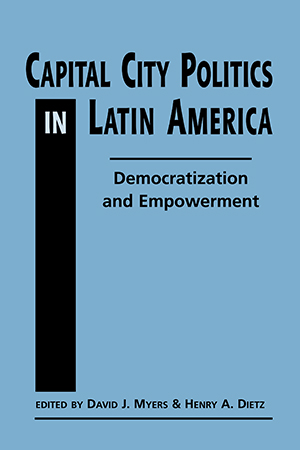
- 2002/408 pages
Capital City Politics in Latin America:
Democratization and Empowerment
Hardcover: $75.00
ISBN: 978-1-58826-040-6
Ebook: $75.00
ISBN: 978-1-62637-128-6
As Latin America's new democratic regimes have decentralized, the region's capital cities—and their elected mayors—have gained increasing importance. Capital City Politics in Latin America tells the story of these cities: how they are changing operationally, how the the empowerment of mayors and other municipal institutions is exacerbating political tensions between local executives and regional and national entities, and how the cities' growing significance affects traditional political patterns throughout society.
The authors weave a tapestry that illustrates the impact of local, national, and transnational power relations on the strategies available to Latin America's capital city mayors as they seek to transform their greater influence into desired actions.







